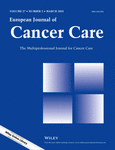Comprehensive unmet needs and correlations with quality of life in Chinese cancer patients
Abstract
Increasing evidence indicates unmet supportive need as a detrimental effect on patients’ well-being. However, the unmet needs and correlations with quality of life (QOL) in mainland Chinese cancer patients remain unclear. This study aimed to assess the unmet needs and QOL in Chinese cancer patients, and further explore the influencing factors. A cross-sectional descriptive study design was applied. Using a convenience sampling method, 300 cancer patients, including 176 females and 124 males were recruited from five tertiary hospitals in Xi'an city during April to July 2015. Self-administered questionnaires including general information, Comprehensive Needs Assessment Tool (CNAT) and the 36-item Short-Form Health Survey (SF-36) were used for data collection. The mean age of the participants was 52.96 ± 13.45 years. The total score of CNAT was 46.37 ± 21.87, and the most unmet comprehensive needs were healthcare staff, information and health facilities and services domain. The total score of QOL was 48.95 ± 18.80 and 50.35 ± 19.77 for physical and mental QOL respectively. Multiple regression analysis revealed that age, employment status (employed), marital status (unmarried/divorced/widowed) and high needs in physical symptoms were associated with physical QOL. In addition, gender (female), marital status (unmarried/divorced/widowed), and needs in health and psychological problem and physical symptoms domains are significant factors to the mental QOL. These findings from the study provide useful information for care providers to identify and meet specific needs for cancer patients to improve QOL.




